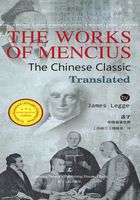
CHAPTER X
1. Mencius gave up his office, and madearrangements for returning to his native State.
2. The king came to visit him, and said, 'Formerly,I wished to see you, but in vain. Then, I got the opportunity of being by your side, and all my court joyed exceedingly along with me. Now again you abandon me, and are returning home. I do not know if hereafter I may expect to have another opportunity of seeing you.' Mencius replied, 'I dare not request permission to visit you at any particular time, but,indeed, it is what I desire.'
3. Another day, the king said to the officer Shih,'I wish to give Mencius a house, somewhere in the middle of the kingdom, and to support his disciples with an allowance of 10,000 chung, that all the officers and the people may have such an example to reverence and imitate. Had you not better tell him this for me?'
4. Shih took advantage to convey this message by means of the disciple Ch'ăn, who reported his words to Mencius.


为之辞, the double object after 为. The remark was a severe thrust at Ch'ăn Chiâ's own conduct.
CHAPTER 10. MENCIUS IN LEAVING A COUNTRY OR REMAINING IN IT WAS NO T INF LUENCED B Y P ECUNIARY CONSIDERATIONS, BUT BY THE OPPORTUNITY DENIED OR ACCORDED TO HIM OF CARRYING HIS PRINCIPLES INTO PRACTICE.
1. 致为臣,—致 as in chap. v. 2, only it is here simply'resignation', with little of the idea of sacrifice. 而归,'and returned'.—Châo Ch'î says 'to his house', and in accordance with this, he interprets 不敢请耳 below, 'I do not venture to ask you to come in person to see me',which is surely absurd enough. The meaning must be what I have given.
2. 前日,—referring to the time before Mencius first d one)='同朝之臣,朝同h'î.'n(hallCâo,2ttccameothe officers of the court with himself'. 继此=继此见,'in continuation of this seeing'. Mencius sees that the king with his complimentary expressions is really bidding him adieu, and answers, accordingly, in as complimentary a way, intimating his purpose to be gone.


6. 'Chî-sun said, "A strange man was Tsze-shû Î.He pushed himself into the service of government.His prince declining to employ him, he had to retire indeed, but he again schemed that his son or younger brother should be made a high officer. Who indeed is there of men but wishes for riches and honour? But he only, among the seekers of these, tried to monopolize the conspicuous mound.
5. Mencius said, 'Yes; but how should the officer Shih know that the thing could not be? Suppose that I wanted to be rich, having formerly declined 100,000 chung, would my now accepting 10,000 be the conduct of one desiring riches?
7. '"Of old time, the market-dealers exchanged the articles which they had for others which they had not,and simply had certain officers to keep order among them. It happened that there was a mean fellow, who made it a point to look out for a conspicuous mound,and get up upon it.


3. The king after all does not like the idea of Mencius's going, and thinks of this plan to retain him,which was in reality what Mencius, in chap. iii, calls'bribing' him. 为, the 4th tone.
4. Ch'ăn here is the Ch'ăn Tsin of chap. iii. 因 is explained by 依托, 'entrusted to'. But it is more, and=to take advantage of, with reference to Ch'ăn's being a disciple of Mencius.
5. Mencius does not find it convenient to state plainly his real reason for going,—that he was not permitted to see his principles carried into practice,and therefore repels simply the idea of his being accessible to pecuniary considerations. 100,000 chung was the fixed allowance of a 乡, which Mencius had declined to receive.
6. Of Chî-sun and Tsze-shûȊ we know only what is mentioned here. Châo Ch'î says that they were disciples of Mencius, and that Chî-sun made his remark with a view to induce Mencius to push forward his disciples into the employment which he could not get for himself. But such a view is inadmissible. 使己, 使其子弟, —the first 使, it is said, merely refers to the prince's employment of him, and the second to his contriving and bringing about the employment of his son or younger brother; but why should we not give the character the same force in both cases? 龙, the 3rd tone, read as and=垄, 'a mound'. 断, 4th tone, 'cut','abrupt', 'well defined'.
7. 治, 2nd tone. Observe the force of 耳,


Thence he looked right and left, to catch in his net the whole gain of the market. The people all thought his conduct mean, and therefore they proceeded to lay a tax upon his wares. The taxing of traders took its rise from this mean fellow."'